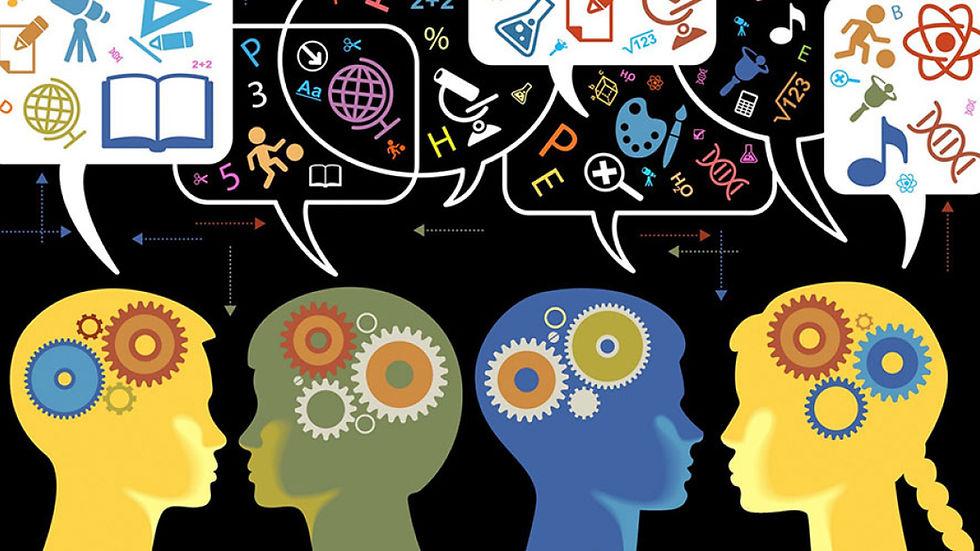If AI is doing all the thinking, what's college for?
- Joanne Jacobs

- May 8, 2025
- 3 min read

AI has made it very, very easy for young people to cheat their way through college, writes James D. Walsh. Students know they're learning less, but can't shake the habit. Professors are in despair: They think they know when students are cheating, but they aren't sure enough to call them on it. And the bots just get better and better.
Chungin “Roy” Lee tells Walsh he used ChatGPT to write the essay that got him into Columbia, and then for nearly every assignment. The work wasn't "relevant," he says.
Why bother to go at all? An Ivy League university is “the best place to meet your co-founder and your wife," Lee said.
A computer science major, he and his co-founder created a tool to help would be programmers cheat in remote interviews for high-tech internships and jobs. Often, applicants are asked to solve riddles on the spot. His tool claimed to provide AI help without being visible to the interviewer.
He was put on probation by Columbia, then suspended. He didn't return.
Two months after OpenAI launched ChatGPT, 90 percent of college students were using AI for homework help, notes Walsh. Chatbots, which now include "Google’s Gemini, Anthropic’s Claude, Microsoft’s Copilot, and others" are as ubiquitous as college sweatshirts and red Solo cups.
Bots "take their notes during class, devise their study guides and practice tests, summarize novels and textbooks, and brainstorm, outline, and draft their essays. STEM students are using AI to automate their research and data analyses and to sail through dense coding and debugging assignments."
A Canadian student wrote online that she spends so much time on TikTok that she has little left to do schoolwork. "With ChatGPT, I can write an essay in two hours that normally takes 12.”
Teachers say students use ChatGPT for everything. A University of Arkansas at Little Rock philosophy professor caught Ethics and Technology students using AI to respond to the prompt “Briefly introduce yourself and say what you’re hoping to get out of this class.”
If the bot includes hallucinated nonsense, some students turn in the paper anyhow, a professor says. They don't write it, and they don't read it.
“Massive numbers of students are going to emerge from university with degrees, and into the workforce, who are essentially illiterate,” said Troy Jollimore, a Cal State Chico ethics professor. “Both in the literal sense and in the sense of being historically illiterate and having no knowledge of their own culture, much less anyone else’s.”
"The ideal of college as a place of intellectual growth, where students engage with deep, profound ideas, was gone long before ChatGPT," writes Walsh. Many students want a credential that will lead to a high-paying job.
But students who've used AI through college won't bring any skills to the workforce, Lakshya Jain, a computer-science lecturer at Berkeley, tells his students. “If you’re handing in AI work, you’re not actually anything different than a human assistant to an artificial-intelligence engine, and that makes you very easily replaceable. Why would anyone keep you around?”
Not surprisingly, "early research shows that when students off-load cognitive duties onto chatbots, their capacity for memory, problem-solving, and creativity could suffer," writes Walsh. Students who let AI do the thinking for them lose some of their ability to think for themselves.
In April, Lee and his partner launched Cluely, which "scans a user’s computer screen and listens to its audio in order to provide AI feedback and answers to questions in real time without prompting," writes Walsh. In an ad, an engineer uses Cluely-enabled glasses to fake his way through a first date with a woman. It's not a reality yet, but "the idea is that someday soon it’ll run on a wearable device, seeing, hearing, and reacting to everything in your environment. " And then it will be a brain implant.
Lee plans to market Cluely as a way to "target the digital LSATs; digital GREs; all campus assignments, quizzes, and tests. . . . It will enable you to cheat on pretty much everything.”
More students will be writing essays and taking tests in person -- probably by hand -- to show they possess some natural intelligence. However, the market value of a college degree is bound to go down if graduates can offer neither academic skills nor a work ethic.



There was as story about a year ago that explained some of the undetectable ways students are using AI. Instead of asking it to write a whole paper, they input: give me three thesis topics for _____. They the pick one and ask: give me five main points to back up the thesis. Then they ask it to provide each bit. Chunking it that way gets cleaner answers--less detectable--than just cribbing the whole thing.
----
My kid was a TA in comp sci for the last couple years at a Big10 school. She said that kids use AI for the first year or two, then hit a wall. The AI could only take them so far, before they had to…